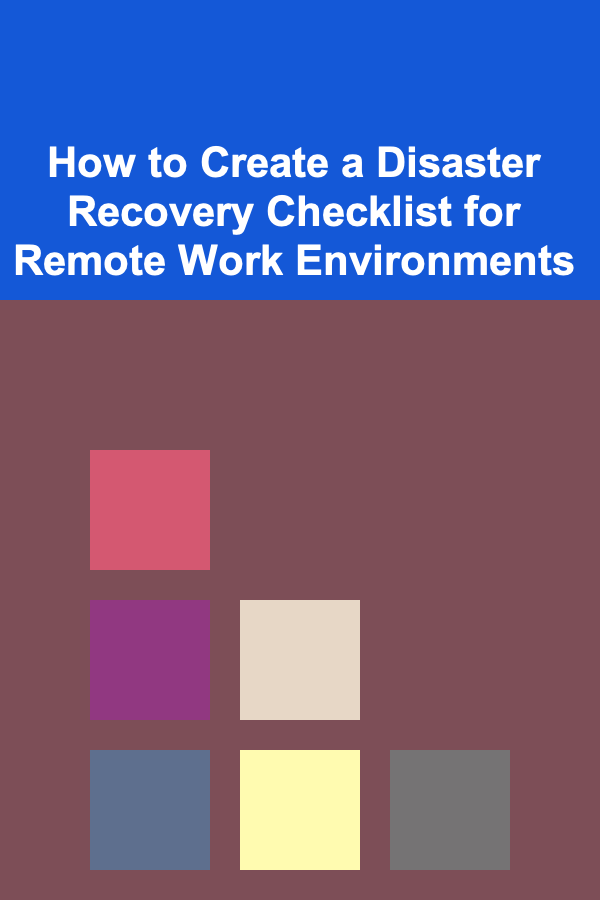
The Role of Online Courses in Enhancing Your Remote Job Prospects
ebook include PDF & Audio bundle (Micro Guide)
$12.99$5.99
Limited Time Offer! Order within the next:

The remote work landscape has dramatically transformed over the last few years, with more businesses offering flexible work options than ever before. Whether you're looking to pivot your career, gain new skills, or simply stay competitive in an evolving job market, online courses have become a key resource for enhancing your remote job prospects.
In this actionable guide, we will explore how online courses can boost your chances of securing a remote job, improve your skills, and increase your employability.
Why Online Courses Matter for Remote Jobs
The shift towards remote work has brought about a range of changes in the skills and competencies that employers prioritize. Many remote roles require technical proficiency, self-management, communication skills, and adaptability, among others. Online courses offer an accessible and flexible way to acquire and refine these skills, making them an essential tool for job seekers.
1. Building the Right Skill Set
Remote work often demands a diverse set of technical and soft skills. For example, proficiency in tools like Zoom, Slack, Google Workspace, project management software, and collaboration platforms is crucial for remote workers. Online courses allow you to learn how to use these tools effectively, ensuring that you're not left behind in an increasingly digital workspace.
Key Skills for Remote Work:
- Technical Skills: Many remote jobs, especially in fields like tech, marketing, and design, require proficiency in specific software and platforms. Online courses can teach you everything from coding languages to graphic design tools and digital marketing strategies.
- Time Management: Remote jobs require a high level of discipline, as there's often no direct supervision. Courses focused on productivity, task management, and time-blocking strategies can help you stay organized and productive.
- Communication Skills: Clear and concise communication is essential in remote work environments. Courses on writing, virtual presentation skills, and conflict resolution can enhance how you communicate with colleagues and clients.
2. Specializing in In-Demand Areas
While some remote jobs require general skills, others are more specialized. Online learning platforms like Coursera, Udemy, and LinkedIn Learning offer a vast array of courses that allow you to specialize in trending and in-demand fields.
High-Demand Fields for Remote Work:
- Software Development: As businesses move their operations online, demand for developers---whether in web development, mobile app development, or cybersecurity---has skyrocketed. Online coding bootcamps and courses provide an efficient way to get started in this field.
- Digital Marketing: From SEO and content marketing to social media management and email campaigns, the need for digital marketing professionals is growing rapidly. Completing online certifications in these areas can give you an edge.
- Data Analytics: Remote data analysis roles have grown in popularity across industries. Learning tools like SQL, Python, Tableau, and Excel through online courses will make you an attractive candidate for remote data-related positions.
- Project Management: Remote project managers are responsible for overseeing tasks, deadlines, and teams in virtual environments. Courses in Agile, Scrum, and PMP (Project Management Professional) can help you qualify for such roles.
3. Flexibility and Accessibility
One of the most significant advantages of online courses is their flexibility. Most online courses are asynchronous, meaning you can complete the lessons at your own pace and according to your schedule. This is particularly important for individuals juggling other responsibilities, such as current jobs, family obligations, or a busy personal life.
Moreover, many online courses are free or low-cost, providing accessible opportunities for individuals who may not have the resources to attend traditional in-person training. This democratization of education has made it easier for anyone to develop the skills needed for remote roles without breaking the bank.
4. Building a Portfolio
Online courses often include hands-on projects, assignments, and assessments, giving you a chance to build a portfolio that showcases your skills. This is especially valuable for remote roles in creative industries such as graphic design, writing, or web development.
A portfolio is often more important than a resume for remote work, as it provides tangible evidence of your abilities. Many online learning platforms allow you to share your completed projects on your personal website or portfolio, making it easier for hiring managers to see the quality of your work.
5. Networking and Community Building
In addition to skills, many online courses provide opportunities for networking with peers, instructors, and industry professionals. Platforms like LinkedIn Learning offer access to industry-specific groups and discussion boards where you can exchange ideas, ask questions, and even make valuable connections.
Building a professional network is essential for remote job seekers. These connections can help you discover job openings, get recommendations, or even secure freelance gigs. By actively participating in course discussions and alumni groups, you can expand your network and increase your visibility to potential employers.
6. Staying Competitive in a Global Job Market
Remote work often means that you're competing for roles with candidates from all over the world. To stand out, you need to differentiate yourself from others in terms of both qualifications and skills. Online courses give you the opportunity to gain niche expertise that could set you apart in a crowded job market.
In addition to technical proficiency, remote employers highly value candidates who demonstrate continuous learning and professional growth. By taking online courses, you signal to employers that you are committed to staying current with industry trends and developing your skillset.
7. Boosting Confidence
Job searching, particularly for remote roles, can be a daunting experience. The competition is fierce, and it can be hard to stand out in a sea of applicants. Completing online courses can provide a significant confidence boost, as you'll gain new skills and competencies that empower you to apply for a wider range of positions.
Moreover, many online courses offer certifications upon completion, which can serve as a tangible recognition of your accomplishments. These certificates can be added to your resume or LinkedIn profile, making you a more appealing candidate to potential employers.
Best Online Learning Platforms for Remote Job Seekers
While there are countless online platforms offering courses, some stand out for their comprehensive offerings, quality instructors, and industry-recognized certifications. Here are a few platforms to consider:
1. Coursera
Coursera partners with top universities and companies to offer high-quality online courses, certificates, and degrees. It's ideal for individuals looking to specialize in fields like business, data science, computer science, and digital marketing. Coursera's professional certificates from companies like Google and IBM can add credibility to your resume.
2. Udemy
Udemy offers an extensive library of courses on a wide range of topics, including software development, design, and marketing. The platform is known for its affordability and user-friendly format, making it a popular choice for both beginners and more experienced professionals.
3. LinkedIn Learning
LinkedIn Learning offers courses on a wide range of topics, including technical skills, business management, and creative disciplines. With a LinkedIn premium subscription, you can gain access to thousands of courses designed to enhance your career prospects and build in-demand skills.
4. edX
Founded by Harvard and MIT, edX offers free and paid courses from top universities around the world. It's particularly strong in fields like computer science, engineering, and business. edX offers MicroMasters programs and professional certificates that are widely recognized by employers.
5. Skillshare
For those interested in creative industries like design, photography, and writing, Skillshare offers a community-driven learning experience. It's a great platform for building a creative portfolio while learning practical skills in design, photography, and video editing.
How to Choose the Right Online Course for Remote Jobs
When selecting an online course, it's important to evaluate several factors to ensure it aligns with your career goals:
- Relevance: Choose courses that are directly related to the type of remote job you want. For example, if you're interested in becoming a remote web developer, focus on coding courses like HTML, CSS, JavaScript, and backend programming.
- Accreditation: Ensure that the course or certificate comes from a reputable platform or institution. Look for courses offered by well-known universities or recognized companies in the industry.
- Reviews and Ratings: Read course reviews and ratings from previous students to gauge the quality of the course. Real feedback can provide valuable insights into the course content, instructor, and overall experience.
- Instructor Expertise: The instructor's experience and background in the subject matter is a key consideration. Ideally, they should have industry experience or a strong academic background in the area they are teaching.
- Completion Time and Flexibility: Consider how much time you can dedicate to learning. Some courses offer flexibility, allowing you to learn at your own pace, while others may be time-bound. Choose one that fits your schedule and learning preferences.
Conclusion
In an increasingly competitive job market, remote work offers exciting opportunities. However, to stand out, you need to continuously upgrade your skills and demonstrate your ability to thrive in a virtual work environment. Online courses play a pivotal role in equipping you with the tools and expertise needed to succeed in remote job roles.
By strategically investing in online learning, you can not only enhance your employability but also position yourself as a skilled, adaptable, and confident professional ready for the future of work. Whether you're aiming to switch careers, specialize in a high-demand field, or improve your soft skills, online courses provide the flexible, cost-effective, and comprehensive learning experiences necessary for your remote job success.

How to Avoid Multitasking and Improve Focus
Read More
How to Choose the Right Financial Advisor for Investment Guidance
Read More
How to Create a Disaster Recovery Checklist for Remote Work Environments
Read More
How To Start a Laundry and Dry-Cleaning Pickup Service
Read More
How to Find Affordable Flights to North America
Read More
How to Transition from Project Manager to Scrum Master
Read MoreOther Products

How to Avoid Multitasking and Improve Focus
Read More
How to Choose the Right Financial Advisor for Investment Guidance
Read More
How to Create a Disaster Recovery Checklist for Remote Work Environments
Read More
How To Start a Laundry and Dry-Cleaning Pickup Service
Read More
How to Find Affordable Flights to North America
Read More